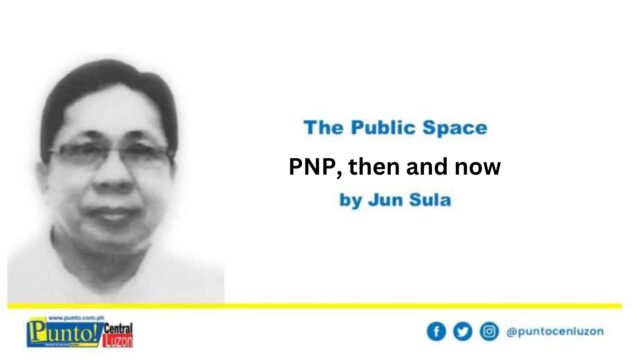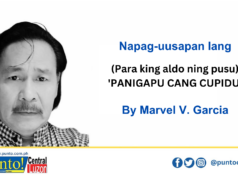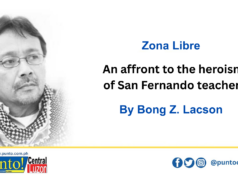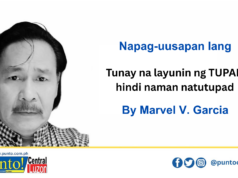Long before the so-called “poster boy” of the drug war under former President Duterte dropped the biggest bombshell, there were already issues said under the breath. Something was seriously wrong in the Philippine National Police (PNP).
But nothing came close or as big as the recently devastating blow to the image of the PNP. “The biggest crime group” in the Philippines , so boldly described by Lt. Col. Jovie Espenido during a hearing by the four-committee hearing or quad-com of the House of Representatives.
Objectvely, a fair and appropriate definition of the alleged crime committed was lost in the details of apparently unlawful conducts from violation of due process to outright killing of suspects. No doubt, the unlawful actions already spoke for themselves and perhaps defining it would only belabor the obvious and shameful. The devil was already in the detail.
As it is, though, long-term objectives are obscured by the short-term agenda. Politicking or politicization becomes the easy judgment. For lack of clear objectives and defining terms, the real benefit of the legislative exercise is eventually lost .
During the time of former President Ramos, a moral recovery program for the PNP was launched with less than FVR’s sister, Leticia Shahani,a former senator and ambassador, as the guiding light. The title of the program was a give-away. In the police organization,it seemed, there was confusion between right and wrong.
The aim was not only politically correct but lofty . For a time, it caught fire and pessimism energized the air that a new PNP would rise to a new height. The timing was also perfect or historical. The nation was still euphoric over the peaceful revolution that ended the dictator’s days and installed a democratic one.
Bad habits, however, refused to die.
The late Pampanga governor Bren Z. Guiao once had a special personal briefing on what ailed the PNP at the time. He and his staff were having a late lunch at a popular Kapampangan restaurant when he caught a familiar figure in sight,
Guiao quickly ordered his security aide to run after a familiar personality about to board his car. The man turned out to be General Felizardo Tanabe, known to many Kapampangan leaders. Guiao invited him to have lunch with the group and soon the conversation shifted to the problem the PNP was having.
At a certain point, the general apologized to a police officer who was with the Guiao group. He started his jeremiad as if it were coming from an avuncular elder. He knew the problem at heart a and was in no mood to sweep it the rugs.
“ The officers I know now”, he said in a low but clear voice” are different from the ones I knew before”. He remembered one particular general who lived in an apartment when he entered the service and came out of service from the same humble abode.
“ Pasensya na”, he told the police officer,” but that’s the reality now”.
Apparently, Espinido ,in his own time and by his own narrative , joined the police with the same fervor for ideal public service and a strong fear of God. It was also Manichean in his concept to root out undesirables in his community.
Accordingly, he was tapped to clean and clear the area under him of drug suspects. Soon, he became the preferred choice to handle the drug problems in others areas and confessed to have perfectly understood their instruction, or thought so. Until, he became part of the problem when he found himself in the list of drug suspects under the Duterte administration.
Then he realized what was wrong.
Espinido is now of one the big whistle blowers in exposing the rot in the PNP. He, however, does not implicate Duterte in personally tasking him to “neutralize” certain drug personalities but tagged former PNP chief and Senator Ronald” Bato” Dela Rosa. He has since denied Espenido’s expose.
Comparatively, in some countries in Asia, when well-known personalities and public officials are implicated in some wrongdoing from corruption to unlawfulness, they resort to “hara-kiri” or suicide to spare their families from shame.
There’s no such thing in the Philippines. Theirs is unique pride in being highly Westernized ,God-fearing and puts a high value on forgiveness. We also forget easily.
There’s no end yet to the ongoing hearings in the House and the Senate into the twin evils of the drug war and the POGO mania that have been the curse for the Philippine society, in general, and some government agencies in particular.
The election is not too far off. The ongoing hearings are suspect to simply bolster some politicians’ rating at this early, making hay while the sun shines, so to speak.
In particular, confessions made by the likes of Espinido and other persons are viewed as strengthening the probe against Duterte and company for alleged crime against humanity in the International Criminal Court(ICC) which is increasingly becoming a possibility as the current administration changes its tune.
In the long run, it will be a mistake if such hearings would be pursued for narrow political ends instead of seeking genuine justice and well-meaning reforms in institutions that have been ab used for selfish political agenda.
Otherwise, meaningful change becomes impossible. Hearings amount to zero sum games





